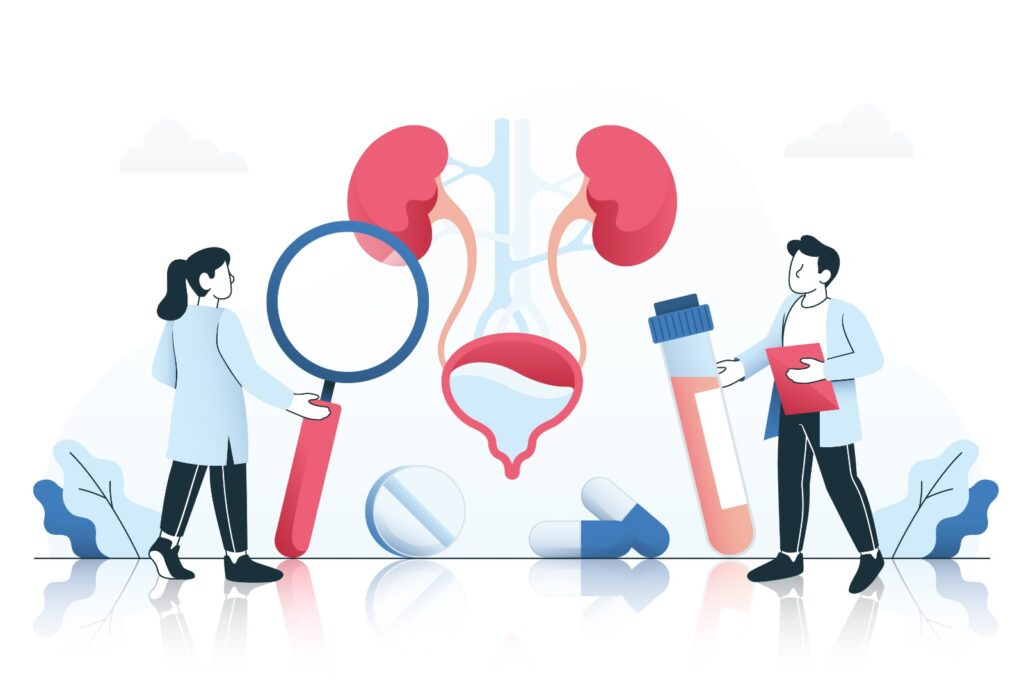Understanding Prostate Cancer Disease: Symptoms, Diagnosis, and Treatment in Hyderabad
As a senior urologist with extensive experience in treating prostate cancer disease in Hyderabad, I regularly see how early detection and personalized care significantly improve outcomes.
This guide walks you through common symptoms, risk factors, and the latest treatments including robotic prostate surgery and MRI-guided prostate biopsy.
What Are the Early Symptoms of Prostate Cancer Disease?
In its early stages, prostate cancer disease often develops silently. However, some early signs may include:
* Frequent urination, especially at night
* Weak or interrupted urine stream
* Pain or burning during urination
* Blood in urine or semen (hematuria)
These may mimic conditions like BPH or prostatitis, but persistent symptoms should always prompt evaluation by a urologist in Hyderabad.
Symptoms of Advanced Prostate Cancer
When prostate cancer symptoms spread, it may lead to:
* Erectile dysfunction
Patients may notice a reduced ability to achieve or maintain an erection.
* Lower back or hip pain
Pain may feel dull or sharp and is usually persistent, unlike typical muscular or injury-related pain
* Fatigue and weight loss
You may feel constantly tired, even after resting.
* Bone pain or fractures
This may cause localized bone pain, especially with movement.
* Leg swelling (lymphatic spread)
This can result in swelling of the legs, ankles, or feet.
These require prompt and aggressive treatment for prostate cancer to prevent further complications.
What Causes Prostate Cancer? Key Risk Factors
Risk factors that may increase your chances of developing prostate cancer disease include:
- Age >50 years
Risk increases sharply with age. Over 60% of prostate cancers are diagnosed in men over the age of 65. Routine screening is generally recommended starting at age 50 or earlier if other risk factors are present. - Family history of prostate or breast cancer
A man whose father, brother, or son had prostate cancer is at 2 to 3 times higher risk. A family history of breast or ovarian cancer, especially linked to BRCA1 or BRCA2 mutations, also raises prostate cancer risk - African/Caribbean ethnicity
A man whose father, brother, or son had prostate cancer is at 2 to 3 times higher risk. A family history of breast or ovarian cancer, especially linked to BRCA1 or BRCA2 mutations, also raises prostate cancer risk - High-fat, red-meat diet
Diets rich in red or processed meats, saturated fats, and low in fruits and vegetables are linked to increased risk. Oxidative stress and inflammation triggered by such diets may contribute to cancer cell growth. - Hormonal imbalances (testosterone/DHT)
Elevated levels of testosterone and its potent derivative DHT (dihydrotestosterone) can stimulate prostate cell division, increasing the chance of mutations. Hormone-sensitive tumors may grow more rapidly. - Exposure to industrial chemicals or pesticides
Long-term exposure to certain chemicals, herbicides (like Agent Orange), or heavy metals in industrial settings may be linked to increased cancer risk, although research is ongoing
Knowing your risk helps determine when to begin prostate cancer screening.
How Is Prostate Cancer Diagnosed?
- PSA (Prostate-Specific Antigen)* blood levels are a crucial screening marker.
- DRE (Digital Rectal Exam)* helps detect abnormalities in prostate texture or size.
MRI-Guided Biopsy for Prostate Cancer in Hyderabad
If PSA is elevated, the gold standard is now MRI fusion-guided biopsy for prostate cancer. It includes:
* Accurately targets suspicious areas (PIRADS 3–5)
* Reduces over-diagnosis and complications
* Increases detection of significant cancer
I routinely perform MRI-guided biopsies at Yashoda Hospital, offering higher diagnostic accuracy and faster recovery.
Prostate Cancer Staging: Local vs. Advanced
Understanding the stage of prostate cancer disease is essential for treatment planning:
Stage I: Low-risk, localized tumor
Stage II: Localized, possibly higher-grade
Stage III: Spread to seminal vesicles
Stage IV: Spread to lymph nodes, bones, or distant organs
Tools like PSMA PET-CT, MRI, and bone scans assist in accurate staging.
Treatment for Prostate Cancer in Hyderabad
1. Active Surveillance
Ideal for low-risk cancers. Regular PSA checks, MRI scans, and repeat biopsies monitor slow-growing cancers without immediate intervention.
2. Robotic Prostate Surgery
Robotic-assisted radical prostatectomy is a key treatment option. Benefits include:
* Minimal bleeding and quick recovery
* Better nerve-sparing to preserve potency
* High cancer control in localized disease
3. Radiation Therapy
EBRT (External Beam Radiation)
Brachytherapy(radioactive seed implants)
Often combined with hormone therapy for better disease control.
4. Advanced Therapies for Metastatic Prostate Cancer
Hormonal therapies (ADT)
Chemotherapy (e.g., Docetaxel)
PSMA-targeted radionuclide therapy
Immunotherapy & targeted drugs (for CRPC)
Looking for robotic prostate surgery in Hyderabad?
https://www.drgopichandm.com/services/robotic-surgery
Why Choose a Specialist Urologist in Hyderabad?
Detecting prostate cancer early with the right tools like MRI-fusion biopsy and PSA screening improves cure rates and quality of life.
At my Prostate & Kidney Clinic, we use advanced diagnostics, robotic surgery, and a personalized approach for every patient.
Schedule a Consultation
If you’re over 50 or experiencing urinary symptoms, don’t ignore it. Early evaluation can be lifesaving.
Take charge of your health—book your prostate screening today at Yashoda Hospital, Somajiguda. Early detection saves lives.

